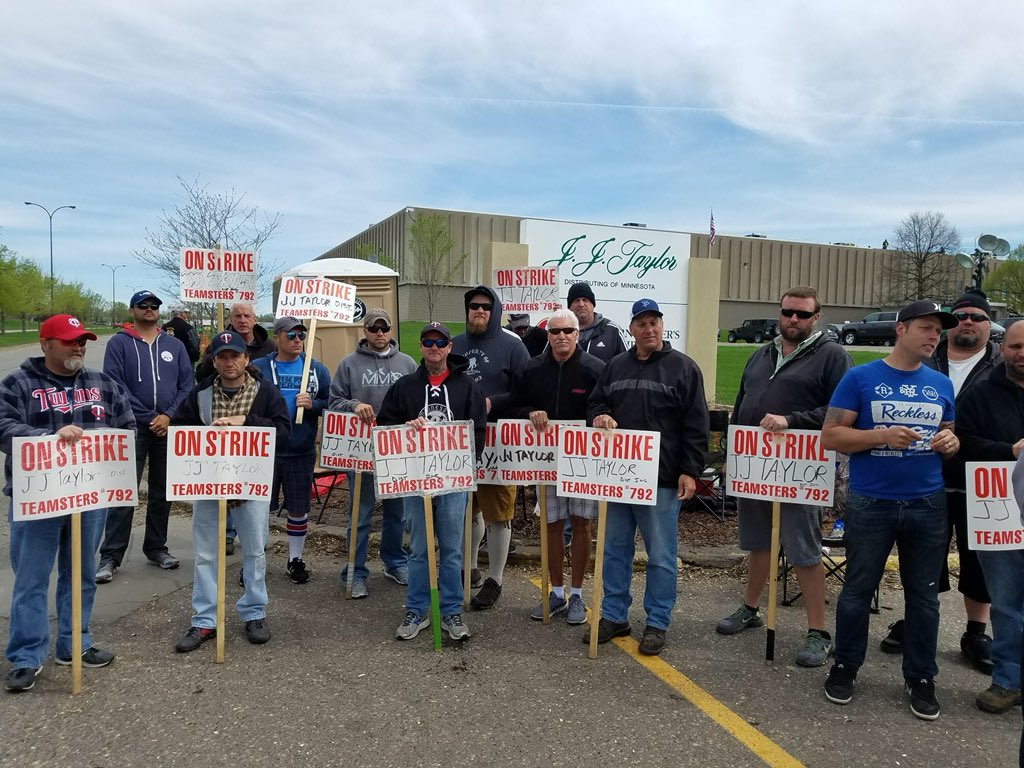The largest beer distributor in Minnesota, J.J. Taylor, has recently tried to save money by incorporating two-person keg delivery routes into one-person packaged beer deliveries. Drivers and warehouse workers responded to the changes with a strike that began with a picket line on April 9.
Under the proposed new route system, Teamsters Local 792 union spokesperson Edward Reynoso said the company’s 93 drivers would have to deliver 50 to 60 kegs a day, weighing 170 pounds each. Currently, several delivery routes are exclusive to kegs and are staffed with a driver and a helper. Those routes would be phased out, merging keg deliveries with all other individual driver routes. Many of the delivery locations are in downtown areas with narrow and sometimes slippery steps, as drivers are often required to deliver kegs into basements of restaurants, bars and liquor stores.
“We believe this puts our workers in peril of obvious injuries,” Reynoso told Truthout. He noted the drivers receive well-paid wages and benefits, but those are not worth the expense of workers’ health. “We would like to sit down and find common ground to work together on this new delivery system and for the company to allow us to provide input on what we feel is safe and unsafe.”
The Department of Labor’s Occupational Safety and Health Administration (OSHA) advises “if kegs must be lifted manually, use two employees whenever possible,” on its website of guidelines for beverage delivery ergonomics.
The union and J.J. Taylor have disputed the reason for the strikes, with the beer distributor claiming the strike is over worker seniority, and that safety concerns weren’t brought up in recent contract negotiations.
“The company was quite surprised,” said J.J. Taylor’s Vice President of Human Resources David Miller. “We are sincerely disappointed and continue to be in dialogue, but it’s all about seniority, and we frankly have been a progressive company when it comes to safety.” Miller cited the ergonomists the company has hired to train staff on how to properly and safely load and unload products.
Reynoso responded, “We know why we’re striking. It has nothing to do with seniority; they are trying to muddy the waters.” The union refused to sign the proposed contract with delivery route changes without the guarantee of a helper to assist drivers in delivering the kegs. J.J. Taylor has insisted the company has hired ergonomic specialists to train drivers how to load and unload the 170-pound kegs by themselves.
As part of the strike, the union has called on the public to boycott the 16 beers included in J.J. Taylor’s portfolio.
Some customers have joined the boycott in refusing to sell products from the distributor in solidarity with union members. Several bars and liquor stores in the Minneapolis area have refused delivery from J.J. Taylor for the duration of the strike.
“I’ve been in business for 38 years and never crossed a picket line,” said Marv Koppen, owner of Party Time Liquor in St. Paul, Minnesota. “Most of my customers are working people. I’ve got the strike posters on the cooler doors. We explain to them what’s going on, and they’re switching brands.”
J.J. Taylor has hired non-union drivers from the crisis response business Huffmaster to continue deliveries during the strike. The Michigan-based Huffmaster markets itself to provide staff and resources to businesses experiencing union strikes. Ironically, according to the union, temporary drivers have been provided helpers to deliver kegs.
In the meantime, drivers continue to show up on the picket line outside of J.J. Taylor’s distribution center in Minneapolis until their demands are met.
Join us in defending the truth before it’s too late
The future of independent journalism is uncertain, and the consequences of losing it are too grave to ignore. To ensure Truthout remains safe, strong, and free, we need to raise $33,000 in the next 2 days. Every dollar raised goes directly toward the costs of producing news you can trust.
Please give what you can — because by supporting us with a tax-deductible donation, you’re not just preserving a source of news, you’re helping to safeguard what’s left of our democracy.
